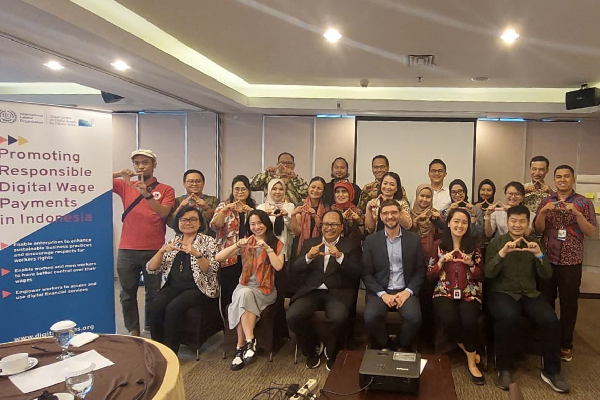Contact us: digitalwages@ilo.org
ILO and APINDO kick off training on responsible digital wage payments for SMEs in Indonesia

The ILO Global Centre on Digital Wages for Decent Work and APINDO, Indonesia’s employers’ organization, have begun their joint effort to train small enterprises on responsible digital wage payments. The in-person training programme’s objective is to assist SMEs (with 10 to 50 employees) in transition from cash to digital wage payments responsibly, enhancing efficiency within the enterprises while promoting workers’ rights and fostering financial inclusion.
On August 24 and 25, the ILO and APINDO organized a two-day co-creation workshop. The main goals were to customize the training content for the Indonesian context, validate the proposed methodology, and enhance the capabilities of national trainers regarding responsible digital wage payments.
The workshop brought together 23 participants, representing various sectors, including government bodies – such as Bank Indonesia, OJK, Coordinating ministry of economic affairs and the Ministry of MSMEs and Cooperatives – private sector organizations, financial institutions, and business service providers. During the workshop, participants shared country-specific insights regarding the present state of digital payments in Indonesia. Additionally, they discussed pertinent aspects of labor legislation pertaining to wage payments and the challenges related to enterprise formalization and the registration of workers into the social security system.
Rudolf Saut, Executive Director of APINDO, highlighted the need for a responsible transition: “moving from cash to digital wage payments in a responsible manner is important because it emphasises a proper procedure that must be followed step by step and is safe for workers. Transition to responsible digital wage payments demonstrates respect for workers’ rights”
Pilot training gathered insights from SMEs in the Greater Jakarta Area
After the co-creation workshop, a pilot training took place on August 27 and 28, engaging 28 SMEs from the Greater Jakarta Area across diverse sectors including garment, food processing, services, manufacturing, restaurants, and retail. The majority of participating SMEs currently utilize cash wage payments, while some have already adopted or are in the process of adopting digital wage payments and seek to deepen their understanding of responsible practices, including strategies to better engage with financial service providers and support workers through the transition.
The pilot training provided valuable insights on the specific needs of SMEs in Indonesia and helped to fine tune the business case for the transition to digital wage payments in smaller enterprises. The participatory methodology used during the sessions fostered collaboration and knowledge-sharing among the attending SMEs. This approach encouraged participants to act as co-mentors, sharing existing good practices and their experiences and challenges engaging with financial institutions and workers.
According to Dede Sulaiman, representative of Koperasi AKSI, a producers’ cooperative in the garment sector that participated in the workshop and training, “the presence of the ILO is a sign that small businesses are also getting attention from stakeholders such as APINDO to be able to adapt to the digital economy. This is a good opportunity for small businesses like us to continue to learn from digital marketing to digital wage payments.”
Over the next months, the training programme will be rolled-out in partnership with APINDO, focusing on SMEs in the garment and retail sectors in the Greater Jakarta Area and Bandung.
